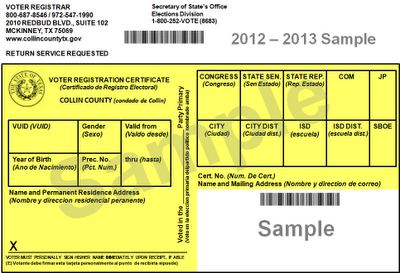 by Deborah
Angell-Smith
by Deborah
Angell-Smith Join us for a Democratic Network Educational Forum discussion on Voter Empowerment and Election Protection, at 10:45am this Sat., September 22nd, at the John & Judy Gay Library in McKinney. A panel of local experts will explain what's supposed to happen - and NOT happen - in pivotal moments and key decisions that can make or break an individual vote or an election. (John & Judy Gay Library - 6861 El Dorado Parkway - Map)
Remember 2000? Hanging chads, voter suppression, overwhelming confusion and voting machines that may - or may not - have counted the votes as they were cast. There were critical failures at many key points along the way that resulted in a stolen election and eight long years of regret.
Today, the King Street Patriots, Tea Party groups and conservative activists of all stripes are recruiting and training followers to "True the Vote" in ways that are clearly designed to intimidate legitimate voters and suppress votes from ethnic and religious minorities, young people and other targeted populations. On the heels of months of voter photo I.D. court fights, deputy voter registrar court fights, redistricting court fights, plus a last minute purge of dead voters who are not dead, confusion and errors in the election process are virtually guaranteed, and we still have concerns about those machines.
Saturday
September 22, 2012 |
22
|
Being informed about these intimidation tactics and failure points before the first votes are cast allows you to defend vulnerable voters and protect the interests of candidates you support. You'll able to share important information with your network and identify potential issues anywhere and everywhere you see them. As a follow-up, our Saturday, October 13th Forum will provide more in-depth information for poll watchers, greeters and others who concerned about protecting voters rights - and we will need LOTS of them. Start recruiting now, and ask them to attend these Forum presentations.
Both programs will be held at the John & Judy Gay Library in McKinney, 6861 El Dorado Parkway, just east of Alma. It's centrally located in the county and offers plenty of room, so please encourage Democratic friends and neighbors to come with you. Join us for coffee and breakfast goodies at 10:45 am and the program will get started at 11. We'll wrap up by 1 pm and those who care to continue the discussion can adjourn to a nearby restaurant for lunch.
Like most activists, the Democratic Network Forum will take a break in November and December. We encourage you to recuperate from the election, rest and spend time with your family and friends. We'll see you at various holiday parties and be back in January with informative programs to educate you about issues that affect us here in Collin County, and what we, as Democrats, can do to make things better. Keep in mind that the Texas Legislature starts back up again in January, and local candidates will be filing for city council and school board elections, so we'll have plenty to talk about!
As always, we invite your input on topics, speakers, format and other options - and encourage you to get involved in growing our network. We'll have sign-up and comment sheets at the event, but if you aren't able to attend, please e-mail us at info@collindems.net, or call (469) 713-2031 to leave a voice message.
It is with deep regret that we share the sad news that Guy Jones, a devoted former Democratic Precinct Chair for Precinct 120 in Allen, Election Judge, member of the Ballot Board and passionate activist passed away Saturday morning after a long struggle with Parkinson's Disease and cancer. He is survived by four adult children, including daughter Marty Jones who has also been active in our community.
Guy was a model Precinct Chair in the days before VAN and kept his own meticulous records about his voter contacts. Likewise, as an Election Judge and member of the Ballot Board he always knew the rules and followed them to the letter. A true gentleman, he was kind to everyone, regardless of their political affiliation, and had a delightful sense of humor. He was also devoted Texas Rangers fan and enjoyed watching games with his family and friends.
Services will held Thursday, 9/20 at 2 pm at Suncreek United Methodist Church at 1517 W. McDermott in Allen, appropriately, across from the Twin Creeks baseball fields. A short graveside service will follow at nearby Ridgeview Cemetery and mourners are invited back to the church for refreshments and fellowship.
Our thoughts and prayers are with Marty and the rest of the Jones family as they mourn the loss of their father and grandfather.
|
|
|






